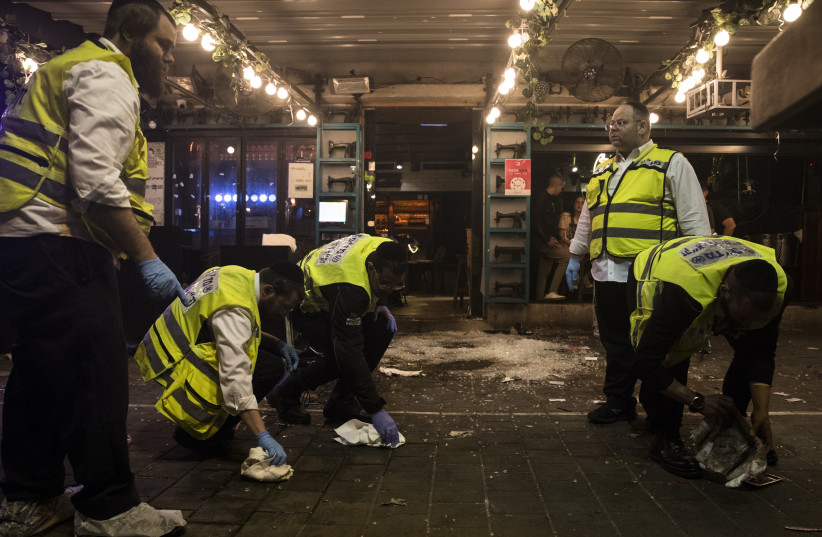On April 7, at nine o’clock on a Thursday night, Tel Avivians were just beginning their weekend and Dizengoff Street is usually the place to be. It is one of the most central areas of Tel Aviv, filled with bars, restaurants and shops, an area that is booming with life and packed with Israelis who just finished the working week.
Ilka Bar is located slightly north of Dizengoff and on Thursdays (like every bar on Dizengoff) it was packed with people enjoying the start of the weekend. A Palestinian man walked past Ilka bar, indistinguishable among the crowds of people. Moments later, he took out his gun and opened fire, murdering three civilians and injuring several others. The terrorist fled the scene, roaming the streets of Tel Aviv for eight hours, traveling four kilometers before the police located and neutralized him by a mosque in Jaffa.
Overnight, a city that is known to celebrate life turned into a terror zone.
Terrorism is a difficult word to understand and unpack, mostly because a full consensus on its true definition doesn’t exist. In the broadest sense, it can be used to describe violence and fear (primarily towards innocent civilians) for ideological purposes. America’s Federal Bureau of Investigation (FBI) uses two sub-definitions of terrorism, the first being international terrorism, which is defined by “violent acts associated with designated foreign terrorist organizations,” and the second is domestic terrorism, which is defined as violent acts committed for ideological reasons, such as those of a political, religious, social, racial or environmental nature.”
Whichever definition you use, both apply to what happened in Israel these past weeks.

Four deadly terror attacks that left 14 civilians dead, though different in nature, all fit under the category of terrorism. The attacks in Beersheba and Hadera were executed by Arab-Israelis with ties to ISIS, an internationally designated terrorist organization, falling into the international terrorism category. The terror attacks in Bnei Brak and Tel Aviv were committed by Palestinians from Jenin, one of whom was previously jailed in Israel. Both the families of these Palestinian terrorists will be compensated by the Palestinian Authority.
The media have an unfortunate history of inaccurate reporting of terrorism in Israel and this time was no different. The headline The Guardian that covered the Tel Aviv attack read “Israeli forces kill Palestinian after Tel Aviv shooting leaves two dead.” Reuters news agency published “Israeli forces shoot dead Palestinian after Tel Aviv bar attack.” It is hard to understand how it’s possible that a Palestinian gunman can walk the streets of Tel Aviv on the busiest of nights, murder three civilians and terrorize an entire city for eight hours, yet this is how a prestigious newspaper chooses to tell the story.
Headlines are the first thing that people see, they are the initial way that the story is being told, and not only did news sources like The Guardian chose to leave out that the Palestinian gunman committed a terror attack, they also chose to start off with depicting Israelis as the aggressor. In what world does a story begin with the people who are terrorized being labeled as the killers?
Almost every single major news source that covered the attacks refused to use the word terrorism in how they presented the attacks. Why are the media so scared to use the word terrorism?
The American Psychological Association has published reports about the implications of labeling terrorism and the impact it has on how countries, populations and individuals behave. Words matter and the terminology we use has an effect of decreasing attacks. When we call out terrorists, it makes it harder for the attackers to bill themselves as heroes, and it makes it easier for countries around the world to take action to stop these attacks and hold the Palestinian government accountable.
By not providing the full context and by using language that minimizes the attacks, these news agencies are complicit in sugarcoating the actions of these terrorists. Using the correct terminology can ultimately save lives.
Israelis are recovering from a tragic couple of weeks. Something that nobody can prepare you for in the aftermath of terrorism is your emotional and physical reactions. The jump every time you hear a loud sound, being on the constant lookout for anything suspicious, the panic you get when you hear an ambulance siren and the constant dangerous thoughts of when is the next one coming that loops in your head.
Ironically, what keeps us sane is going on with our day and acting like everything is normal. We will move past these attacks because we always do, whether the media will report it or not.
The writer is the co-founder and CEO of Social Lite Creative, a digital marketing firm that specializes in geopolitics.
